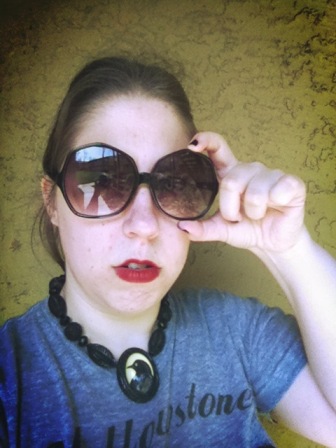feminist of the week: anna hamilton

Name: Anna Hamilton, although I am better known by my nom de net Annaham.
Age: 27
Occupation: Writer/blogger
Hometown: I’m originally from Marin County, CA, although I currently reside in central California.
Describe yourself in one word: Oddball
What is your feminist philosophy?
I strive for an inclusive feminism that centres people who have been marginalised by mainstream feminism, particularly disabled women, trans* women, genderqueer people, and women of colour. As a woman with multiple disabilities – including chronic pain – I’ve experienced firsthand how liberal feminism tends to ignore, or worse, actively silence, those who are not perceived to be “on-message” enough for feminism. My philosophy is that that needs to change in order for feminism to stay relevant, and for it to make further gains for equality.
When did you have your feminist awakening?
I read psychologist Mary Pipher’s book Reviving Ophelia: Saving the Selves of Adolescent Girls when I was 12 or 13 – I was a voracious reader at that age, as I am now. That book really crystallised the importance of feminism for me, and made me realise that some of what I was experiencing at that age (bullying and sexual harassment, to name just two) was not just an anomaly or something that I caused to happen – this stuff happened to other tween and teen girls, and there were social/cultural reasons for it, especially in terms of how gender stereotypes affect young women and men differently.
Why is feminism important in today’s world?
If I answered this in detail, we’d be here all day! But there is a perception that gender-wise, everything is equal now, and like the “post-race” myth in the United States since the election of Barack Obama to the presidency, it’s not true if you dig a little deeper.
How has New Media helped the feminist cause?
New media has definitely allowed people who otherwise might not be present in more traditional activism – protests, for example – to make their voices heard. Due to my fibromyalgia (which causes constant pain and fatigue), I am unable to take part in more “on-the-ground” activism because it’s really an energy-suck, and I’ve found that new media has really opened up a world that I thought was pretty much closed to people like me.
Do you think that feminism has a branding issue? If so, why and how do you suggest the movement can fix it? I think it absolutely does, but in a more complex way than ‘Oh no, women today are afraid to identify as feminists because the word suggests hairy-legged man haters!’ There are many, MANY reasons to not identify as a feminist that are legitimate – as I mentioned previously, mainstream feminism’s track record with taking on the issues of anyone who’s not middle class, white, youngish, non-disabled, heterosexual, and cis-gender is not very good.
I still identify as a feminist, but there are a lot of marginalised women and people who do not. I think that instead of throwing up its collective hands and saying, ‘You are not helping the movement!’ to people who have good reasons for not getting in line with feminism, the movement needs to prioritise listening to and including people that feminism has discounted, ignored or silenced in the recent past.
There’s a tendency for quite a few leading feminists to say, ‘Okay, we will get to your issues later, but right now we need to focus on this’, and then fighting for the rights of women of colour and people with disabilities, for example, never happens. We can’t wait while feminism fights for the rights of a very small group of women and then promises to maybe get to us later; you can tackle multiple oppressions at a time, and I believe that that should be a priority.
What is the most important feminist cause in your life?
Spreading the message that feminism needs to pay greater attention to people who are marginalised by both the wider culture and by feminism itself – and giving feminists compelling reasons as to why they need to pay attention.
What is the most annoying feminist stereotype in your opinion? Why?
The second-wave “goddess hippie Earth worshipper who relies on all-natural remedies and tinctures for health problems” stereotype is not my favourite, mostly because that’s not the way things work anymore – especially for feminists who have complex health issues, or a disability, or chronic pain! We can’t all rely on natural medicine or homeopathy, and to connect that with “all feminists” is quite reductive. There are many feminists who appreciate the gains made by modern medicine, even though some of that history is extremely sketchy (the book For Her Own Good is a great primer on this point).
What does the future of feminism look like?
I’m not sure – I guess we’ll see pretty soon! My visions of the future of feminism seem to change by the day.
What’s your advice to other feminists?
When marginalised women tell you that you’re excluding them or being oppressive, it is generally a good idea to listen and try to improve so that you can do better next time. Jessie-Lane Metz of the Toast recently wrote a very funny satirical guide to “defensive feminism” that shows the steps NOT to take in such a scenario.
Learn more about Anna and her work at her website!

